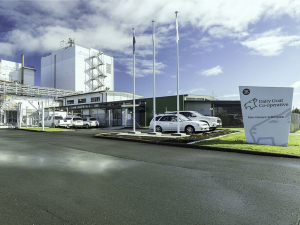Crisis talks on Gore district plan
Moves are underway for farmers and Māori in Southland to try and resolve and get clarity over what appears to be a controversial section of the proposed Gore District Plan.
 Dairy Goat Co-operative will see a new chief executive start next week. Meanwhile, co-op chair Campbell Storey will step down from his role in September.
Dairy Goat Co-operative will see a new chief executive start next week. Meanwhile, co-op chair Campbell Storey will step down from his role in September.
Hamilton-based Dairy Goat Co-operative (DGC) is revamping its leadership in the hope of recovering from its financial doldrums.
A new chief executive starts next week, and the co-op chair Campbell Storey will step down from the role at DGC's annual meeting in September.
Alastair Hulbert, who has a marketing degree from Massey University, starts as CEO on May 20. He replaces David Hemara who left the co-op a month ago. Former chief executive Tony Giles is acting as CEO until Hulbert takes over.
Dairy News understands DGC needs a cash injection to remain viable. There was backlash from farmer shareholders earlier this year after DGC asked suppliers to reduce their milk supply by one-third for the coming season.
In March, Hemara told Dairy News that DGC had advised its shareholder suppliers that it will call for less milk in the 2024/24 season than shareholders would normally expect to supply.
"While the final amount of milk per shareholder is yet to be finalised, we have advised shareholders that we expect that they will be asked to reduce supply to around two-thirds of normal level.
"This reduction is necessary to better balance incoming milk against forecast product sales for 2024/25. This is a continuation of a cap that we have applied for several seasons and reflects changing demand levels in some markets since Covid."
Hemara said that the global supply/demand situation for goat milk has been impacted by four key factors: Declining birth rates internationally, sales channels that have changed during Covid - incuding the Daigou informal sales channel to China, and cost of living pressure in many economies. There has also been a structural change in the China consumer market where over the last four years China consumers have moved strongly to support Chinese domestic brands. This same impact has occurred in the infant formula segment, he added.
"At present, our view is that there is more goat milk than demand globally."
Former Fonterra executive Alex Turnbull has been appointed CEO to lead all five Yili Oceania Business Division companies in New Zealand.
Fonterra executive René Dedoncker is leaving the co-operative later this year to lead Australian agribusiness Elders.
Alliance Group and the Southland Stags rugby team have joined forces in a partnership that will see the the meat co-operative's farmgate brand feature on players' team kits and replica jerseys.
Fonterra's plan to expand its organic programme to the South Island is being well received by farmers, the co-op says.
Voting has started for the renewal of DairyNZ's milksolids levy.
The most successful catchment groups in NZ are those that have 'a source to sea' approach.
OPINION: A dairy version of fantasy football has been launched.
OPINION: In recent weeks beaches in Auckland, Wellington and Christchurch have been unsafe to swim in because of recent heavy…